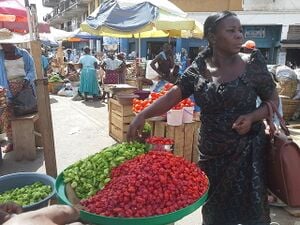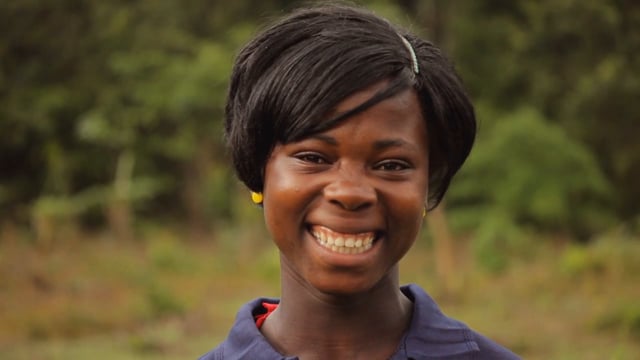
Ghana, officially the Republic of Ghana, is a country in West Africa. It lies adjacent to the Gulf of Guinea and the Atlantic Ocean to the south, sharing a border with Ivory Coast in the west, Burkina Faso in the north, and Togo in the east. Ghana covers an area of 239,567 km2 (92,497 sq mi), spanning diverse biomes that range from coastal savannas to tropical rainforests. With nearly 35 million inhabitants, Ghana is the second-most populous country in West Africa. The capital and largest city is Accra; other significant cities include Kumasi, Tamale, and Sekondi-Takoradi.
The earliest kingdoms to emerge in Ghana were the Kingdom of Dagbon in the north and the Bonoman in the south, with Bonoman existing in the area during the 11th century. The Ashanti Empire and other Akan kingdoms in the south emerged over the centuries. Beginning in the 15th century, the Portuguese Empire, followed by other European powers, contested the area for trading rights, until the British ultimately established control of the coast by the 19th century. Following over a century of colonial resistance, the current borders of the country took shape, encompassing four separate British colonial territories: Gold Coast, Ashanti, the Northern Territories, and British Togoland. These were unified as an independent dominion within the Commonwealth of Nations. On 6 March 1957, Ghana became the first colony in Sub-Saharan Africa to achieve sovereignty. Ghana subsequently became influential in decolonisation efforts and the Pan-African movement.
Networks and sustainability initiatives[edit | edit source]
Climate action[edit | edit source]
Climate change in Ghana is impacting the people in Ghana in several ways as the country sits at the intersection of three hydro-climatic zones. Changes in rainfall, weather conditions and sea-level rise will affect the salinity of coastal waters. This is expected to negatively affect both farming and fisheries. Low precipitation, drought and wild fires are also some major effects associated with climate change in Ghana.
The national economy stands to suffer from the impacts of climate change because of its dependence on climate-sensitive sectors such as agriculture, energy, and forestry. Moreover, access to freshwater is expected to become more challenging while reduced water supply will have a negative impact on hydropower, which provides 54% of the country's electricity capacity. Additionally, Ghana will likely see more cases of malaria and cholera since changes in water conditions impact both. Stagnant water bodies which are formed as a result of some flooding occurrences, may support the breeding of more mosquitoes which will eventually cause the increase in the spread of malaria.
In 2015, the government produced a document titled "Ghana's Intended Nationally Determined Contribution". Following that, Ghana signed the Paris Climate Agreement in 2016. The Intended Nationally Determined Contribution after 2016 became the Nationally Determined Contributions commonly referred to as NDCs, which was reviewed in 2021.
A 2023 report by the USDA Foreign Agricultural Service noted that Ghana "is vulnerable to rising sea levels, droughts, increasing temperatures, and unpredictable rainfall which negatively impacts infrastructure, hydropower production, food security, and coastal and agricultural livelihoods".
Greenhouse gas emissions
In 2021, Ghana's total CO2 emissions from fuel combustion in the energy sector reached 21.397 million tones, highlighting a significant increase of 332% in per-capita emissions since 2000. Despite representing only 0.1% of global emissions from inflammable fuels, this rise is concerning, particularly in international efforts to mitigate climate change impacts. West Africa is among the smallest contributors to global greenhouse gas emissions, but the nations "are already feeling the effects of the climate catastrophe disproportionately".
The primary source of these emissions in Ghana was oil burning, which accounted for 66% of the total CO2 emissions from fuel burning. Sector-wise, transportation emerged as the largest contributor, responsible for 47% of the nation's energy-related CO2 emissions, followed by electricity and heat production at 34%. These figures underscore the urgent need for Ghana to transition towards more sustainable energy sources and improve the efficiency of its transportation and power sectors.
Carbon dioxide (CO2) makes up the vast majority of greenhouse gas emissions from the sector, but smaller amounts of methane (CH4) and nitrous oxide (N2O) are also emitted. These gases are released during the combustion of fossil fuels, such as coal, oil, and natural gas, to produce electricity.
Fossil fuel production
The Jubilee offshore oil field in the Western Region of Ghana began production in 2010, raising expectations for wealth creation in Ghana. However, the infrastructure needed to support Ghana's oil industry (storage, shipping, processing) has necessitated the practice of flaring. "Long-term gas flaring at the Jubilee Field may be inevitable" without accelerated development of infrastructure and would produce about 1.5 million tons of CO2 annually (7 percent of Ghana's total national emissions).
Ghana's petroleum sector has experienced significant growth, particularly since the discovery of oil in commercial quantities in the Jubilee fields in 2007. Average crude oil production capacity has been declining slightly over time, with an average 176,000 barrels per day in September 2021.
Some of the major oil and gas activities are conducted by international oil companies such as Tullow Ghana, Vitol, Kosmos Energy, and ENI, among others. Their sub-contractors include Schlumberger, Baker Hughes, Weatherford, Ocean Rig, and Technip FMC, among others. The sector has been the subject of investment disputes, such as the one between the Springfield Group and ENI/Vitol.
Upstream activities in the Ghanaian petroleum sector include the procurement and refining of crude oil by the nation's only petroleum refinery, Tema Oil Refinery (TOR). Downstream activities include the marketing and distribution of petroleum products by Oil Marketing Companies (OMCs) and the pre-mixing of petroleum products for other industrial uses. OMCs operating in Ghana are mainly multinationals; however, the last decade has seen an increase in the establishment of several small and medium-sized local OMCs.
The Ghana National Petroleum Council (GNPC) has the mandate to explore for oil within the nation's territory. Ghana's oil and gas prospects are significant. Recent discoveries appear to indicate oil and gas resources stretch across the country's shoreline from Cape Three Points in the west to Keta in the east. The Volta Basin is also believed to hold oil and gas reserves onshore. The Government of Ghana, through GNPC, seeks to maximize the country's prospects in the oil and gas sector and extend the country's continental shelf to increase the sector's scope.
The prices of petroleum products are regulated by an independent board. The nation consumes significant volumes of petroleum products, which are mainly imported. The petroleum products produced in Ghana are mainly exported.
Climate change institutions
One of the few important climate change institutions in Ghana is the Center for Climate Change and Sustainability Studies. The center is located in the University of Ghana and it is involved in conducting various research works and projects with regards to climate change in Ghana. It is also a multidisciplinary faculty which explores areas such as health, resource management, economics and renewable energy. All of these research areas they venture into are targeted towards capacity building in climate change and sustainable development.
Impacts on the natural environment
Temperature and weather changes
Lake Volta, the largest artificial lake by surface area in the world, changed climate patterns in Ghana.
The drier northern areas have warmed more rapidly than southern Ghana. Overall, Ghana has experienced a 1.0 °C increase in temperature since 1960. Northern Ghana has only one rainy season, while southern Ghana has two, and annual rainfall is highly variable. Long-term trends for rainfall are challenging to predict. However, USDA's Forest Service concluded in 2011 that there was "no evidence that extreme rain events have either increased or decreased since 1960."
However, when one compares the Köppen-Geiger climate classification map for 1980–2016 and the projected map for 2071–2100 predicted change in classification from "tropical, savannah" to "arid, steppe, hot" in some coastal areas."
Sea level rise
Available data also shows a sea level rise of 2.1 mm per year over the last 30 years, indicating a surge of 5.8 cm, 16.5 cm, and 34.5 cm by 2020, 2050, and 2080. Flooding affects approximately "45,000 Ghanaians every year, and half of Ghana's coastline is vulnerable to erosion and flooding as a result of sea-level rise".
Water resources
Expected decreases in water in the primary river basins providing fresh water for the country, Volta River, Bia River, and Tano River, could increase challenges in getting access to clean drinking water. The volume of water in the Volta Basin was predicted to have a 24% and 45% reduction in 2050 and 2100, respectively. The continuous decrease in precipitation and increasing evaporation rate has the potential to cause political tension in the region as Burkina Faso plans to draw water from the Volta Basin.
Impacts on people
Economic impacts
Agriculture
Forty-five percent of the workforce in Ghana depends on small-holder rain-fed agriculture. Disruption due to erratic rainfall and other extreme weather will harm people's economic well-being. Moreover, staple crops such as Cassava, Maize, and cocoa (the major cash crop of Ghana) are expected to see decreased production. Based on a 20-year baseline climate observation, it is forecasted that maize and other cereal crop yields will reduce by 7% by 2050.
Moreover, the combination of deforestation and new dams that dried up rivers has affected agriculture and, in turn, brought migration to Accra, which increased poor-quality unplanned settlements in the path of potential flash floods.
A 2024 World Bank report estimates that about two million Ghanaians are vulnerable to food insecurity. Should any natural disaster occur, food availability will be significantly affected, particularly in the Northern region and the country's rural areas.
Fisheries
Seafood makes up 40–60 percent of protein intake in Ghana. Key species for the economy are expected to have worse reproduction cycles. Reduction in fisheries production has stimulated importation of more $200million per year worth of seafood. Climate change alone might endanger a vital food source and way of life for Ghana by reducing possible fish catches by 25% or more by 2050.
Hydropower
Because 54% of the national generation capacity is hydropower, unpredictable rainfall is likely to add uncertainty to a power grid already experiencing frequent outages (known as dumsor). Some estimates suggest that capacity could fall by as much as 50% for the Volta Basin. Ghana experienced a reduction in GDP between 2012 and 2015 in partial response to a deficient supply of power.
Health impacts
An increase in waterborne diseases such as cholera and mosquito-borne diseases like malaria is projected. In Ghana, flood-exposed communities have been associated with cholera and non-cholera diarrheal disease outbreaks. According to the World Bank, Ghana's health system is highly vulnerable to the changes in climate, "especially to illnesses like malaria and diarrhea disease ... health issues related to heat, air pollution, and infectious diseases are on the rise with the elderly, youth, and children being particularly vulnerable". As climate change results in more severe and frequent flooding, water source contamination and the spread of waterborne diseases are expected to increase. Abu and Codjoe, in their study conducted in two flood-prone and low-income areas, namely James Town and Agbogbloshie within the Accra Metropolitan Area, revealed that households experience regular cholera outbreaks and a high prevalence of non-cholera diarrhea and other illnesses. These low-income communities also have a large percentage of children under 5 years old who may have weakened immune systems and be particularly vulnerable to environmental challenges.
Mitigation and adaptation
Ghana signed the Paris Agreement on 22 April 2016 and ratified it on 21 September 2016. The first national climate change adaptation strategy in Ghana was developed to be implemented between 2010 and 2020. Adaptation seeks to lower the risks posed by the consequences of climate change. Adaptation measures may be planned or put in place spontaneously in response to local pressure, such as afforestation, land rotation, building climate-resilient structures, solar-powered infrastructure, etc. The Ministry of Environment Science, Technology and Innovation published a policy framework in 2013.
In 2015, Ghana developed a framework entitled "Ghana's Intended Nationally Determined Contribution" to outline a plan to reduce carbon emissions and to improve eternity of land use, transportation, and other economic and societal sectors. This plan, after the Paris Agreement in 2016, became the Nationally Determined Contribution (NDC).
Ghana is experiencing population growth, has a high poverty rate, and its economy is dependent on vulnerable industries like agriculture. Thus, it is a West African country with increased risk of climate vulnerability, including droughts and floods, hunger and disease, that increase human suffering, violence, displacement, and economic collapse in the region.
Ghanaian President Nana Akufo-Addo, the President of Ghana stated, "Our hope depends on the actions we take today." However, Ghana still needs to develop long-term contingency plans for climate change because decision-makers and local managers have an inadequate perception of the costs of dealing with such crises. A 2022 report by the World Bank report noted that Ghana has slowed progress in its economic development and has not fully converted its natural wealth into sufficient infrastructure, human, and institutional capital for sustained growth, but taking a climate resilient and low-carbon pathway could turn challenges into opportunities. With appropriate reforms and investments, it will be possible for Ghana to "deliver large economic and social benefits for its people".
Adaptation
References
Climate change in Ghana is impacting the people in Ghana in several ways as the country sits at the intersection of three hydro-climatic zones. Changes in rainfall, weather conditions and sea-level rise will affect the salinity of coastal waters. This is expected to negatively affect both farming and fisheries. Low precipitation, drought and wild fires are also some major effects associated with climate change in Ghana.
Sustainable livelihood[edit | edit source]
Trees, woodland and forest[edit | edit source]
On 11 June 2021, Ghana inaugurated Green Ghana Day in an aim of planting 5 million trees in a concentrating effort to preserve the country's cover of rainforest to combat deforestation. W
Community energy[edit | edit source]
News and comment[edit | edit source]
2010
2010 SEED Award Winners,[1] November 3
"The Shea Economic Empowerment Program (SEEP)". This fruitful partnership centred on a community-based cooperative and international NGOs seeks to improve the livelihoods of women Shea nut producers by offering training, greater ownership within the supply chain and access to improved technology.
"G-lish: Income Generation, Re-Generation, Next Generation". The aim of this remarkable initiative of local NGOs is to provide value-added income for rural communities by crafting baskets from recycled materials. In doing so, they preserve the age-old basket-weaving tradition and carry out extensive tree-planting operations.
"High-value Syrup from 'Prekese' Fruits for Community Livelihood Empowerment". Relying on local raw materials, the partners of this promising initiative strive to establish the sustainable cultivation and harvesting of Prekese fruits in rural communities, allowing income to be generated over the whole life cycle of the tree.
"Ghana Bamboo Bikes Initiative" is a youth-led, non-profit enterprise committed to the economic empowerment of youth by taking advantage of the abundant bamboo raw materials in Ghana to manufacture and assemble high-quality bamboo bikes - suitable for the road conditions and terrain in Ghana and affordable to the poor.
"DeCo! - Decentralized Composting for Sustainable Farming and Development". The composting firm DeCO! benefits local farmers by producing organic fertiliser in decentralised composting plants following a low-tech approach. By working with local NGOs, government and research institutes, DeCO! aims to inform and educate farmers about the advantages of sustainable soil management.
"Biofuel Production in Promoting Sustainable Land Management". A local NGO in partnership with national research institutions has established a model for rehabilitating degraded community lands, producing food crop and utilising renewable energy through the cultivation and processing of sunflower plants into oil and biodiesel. Their sustainable land management approach also includes bee-keeping.
External links[edit | edit source]
Wikipedia: Ghana


